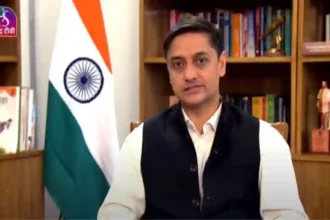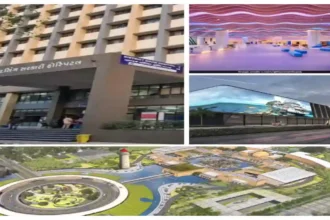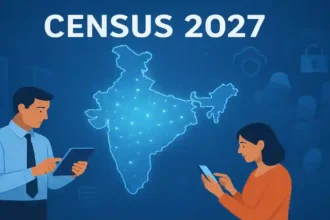
New Delhi, July 9, 2025 – In a significant stride towards educational transformation, the Delhi Cabinet has approved a massive budget allocation of over ₹900 crore for the creation of Smart Classrooms in Delhi government schools. Alongside this digital push, the cabinet has also greenlit the full scale implementation of the National Education Policy (NEP) 2020 in the national capital, setting the stage for a major educational overhaul.This move is being seen as a milestone decision in Delhi’s long standing efforts to modernize its public education infrastructure and align with national educational reforms.
- ₹927.51 Crore Sanctioned for Smart Classrooms in Delhi
- Vision for Smart Classrooms in Delhi
- Integration with National Education Policy 2020
- What Does NEP 2020 Mean for Delhi Students?
- Teacher Training and Capacity Building
- Previous Successes and National Recognition
- Public Reception and Political Reactions
- Challenges Ahead
- A Blueprint for Other States
- Conclusion
This move is being seen as a milestone decision in Delhi’s long standing efforts to modernize its public education infrastructure and align with national educational reforms.
₹927.51 Crore Sanctioned for Smart Classrooms in Delhi
The approved amount ₹927.51 crore will be used to construct and operationalize state of the art Smart Classrooms in Delhi government schools. The project, which falls under the broader mission to digitize and modernize school infrastructure, will cover the construction of 11,000 new smart classrooms.
These Smart Classrooms will be equipped with:
- Interactive Digital Boards
- High Speed Internet Connectivity
- Audio-Visual Learning Aids
- Integrated Learning Management Systems (LMS)Temperature controlled environments
The initiative targets Classes 1 to 12 and seeks to bridge the digital divide among students, particularly those from economically weaker sections. This is one of the largest investments ever made in public schooling infrastructure in the national capital.
Vision for Smart Classrooms in Delhi
Delhi’s Chief Minister, Rekha Gupta, while addressing the media, stated:
“This investment in Smart Classrooms in Delhi is not just an infrastructure boost but a paradigm shift in the way our students will learn and teachers will teach. It reflects our unwavering commitment to providing world class education to every child.”
The goal is to promote experiential learning, critical thinking, and digital fluency, all of which are cornerstones of NEP 2020. The classrooms will feature smart screens that allow real time collaboration, 3D modeling in science and math, and access to online learning platforms.
Integration with National Education Policy 2020
Alongside the technological upgrades, the Delhi Cabinet also gave the green signal for the implementation of the National Education Policy (NEP) 2020. This will bring sweeping changes across:
- Curriculum structure
- Assessment methods
- Teacher training
- Vocational education
- Multilingual learning models
The Delhi Government’s Directorate of Education will roll out the NEP 2020 in phases, starting with pilot programs in selected schools by the end of 2025.
The 5+3+3+4 curricular structure of NEP 2020 will replace the traditional 10+2 system, introducing new pedagogical methods focused on foundational literacy and numeracy, and promoting flexibility in subject choices.
What Does NEP 2020 Mean for Delhi Students?
The policy emphasizes holistic, inclusive, and skill based learning. Under NEP 2020, students in Delhi will experience:
- Reduced curriculum burden
- Emphasis on coding, AI, robotics from middle school
- Introduction of Indian knowledge systems
- Vocational education starting in Grade 6
- Regular formative assessments instead of rote based exams
This aligns seamlessly with the vision of Smart Classrooms in Delhi, where technology will be the enabler for personalized and flexible learning.
Teacher Training and Capacity Building
The government plans to invest heavily in teacher training programs to complement the technological upgradation. More than 25,000 teachers will be trained on digital pedagogy, content delivery through smart systems, and student engagement in a tech-driven classroom environment.
According to officials, specialized modules will also be prepared for school heads and administrative staff to ensure smooth management and monitoring of the Smart Classrooms project.
Previous Successes and National Recognition
Delhi’s earlier “Happiness Curriculum”, “Entrepreneurship Mindset Curriculum”, and “Deshbhakti Curriculum” had already garnered praise from national and international bodies like UNESCO and the World Bank. The current initiative to establish Smart Classrooms in Delhi is expected to further elevate the capital’s public education system to global standards.
In 2023-24, over 20 schools of specialized excellence (SoSEs) saw increased enrollment due to their advanced curriculum and digital teaching methods. With over ₹900 crore now allocated, the government aims to replicate and scale this success across all zones.
Public Reception and Political Reactions
While the move has been largely appreciated by educationists and parents, some critics have pointed out concerns regarding the actual execution of the project. However, the Delhi Government has promised full transparency and timely execution, with progress to be updated on a dedicated public dashboard.
Opposition parties have welcomed the initiative but cautioned against delays and cost escalations, demanding that the quality of the Smart Classrooms in Delhi match global benchmarks.
Challenges Ahead
Despite the ambitious blueprint, implementing Smart Classrooms in Delhi on such a vast scale will not be without challenges:
- Procurement delays due to global supply chain issues
- Power and internet outages in underdeveloped areas
- Resistance to change among traditionally trained teachers
- Cybersecurity and data privacy concerns
To address these, the government has said it will set up a Smart Education Task Force to monitor real time implementation and provide redressal for any infrastructural or technical hurdles.
A Blueprint for Other States
With this project, Delhi could serve as a model for other Indian states aiming to implement Smart Classrooms and NEP 2020 reforms. States like Maharashtra, Tamil Nadu, and Kerala are already observing Delhi’s model for potential replication.
Given the emphasis on digital India, youth empowerment, and education for all, the union government’s Ministry of Education is also expected to lend technical support and possibly offer partial funding under centrally sponsored schemes like Samagra Shiksha Abhiyan.
Conclusion
The approval of ₹927.51 crore for Smart Classrooms in Delhi marks a transformative moment in India’s urban educational landscape. By fusing digital technology with progressive educational reforms like NEP 2020, Delhi is preparing its students for the future a future where learning is not limited to textbooks but powered by technology, innovation, and imagination.
As the capital sets its eyes on becoming the hub of public education excellence, all eyes will now be on the timely and effective execution of this visionary project.
Stay Connected with The News Drill for more updates.
Contact us: contact@thenewsdrill.com
Got a tip or story? Share with us at editor@thenewsdrill.com or visit our Contributor Page.
Explore more on education, policy, and development at The News Drill.







